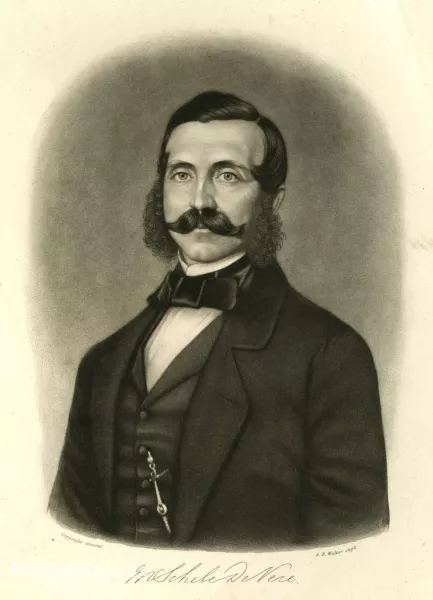
Timeline
Title
Country/Nationality
Maximilian Schele De Vere
Maximilian Schele De Vere (born 1820), a name that echoes through the halls of literary history, captivated readers with his profound insight and mesmerizing prose. With a career spanning decades, De Vere carved a niche for himself as a master wordsmith and a true visionary.
Introduction:
Maximilian Schele De Vere, a renowned professor of modern languages at the University of Virginia and a founding member of the American Philological Society, made notable contributions to language education in 19th-century America. Born in Sweden as Maximilian von Scheele, he later adopted the name Schele De Vere, possibly after marrying an Irish woman named De Vere. This essay delves into the life and career of Maximilian Schele De Vere, highlighting his academic achievements, support for the Confederacy during the American Civil War, and the controversies surrounding his resignation and personal struggles.
Early Life and Education:
Born in Sweden, Schele De Vere embarked on a path of linguistic exploration. After immigrating to the United States, he assumed the name Schele De Vere, potentially due to his marriage to an Irish woman. He honed his language skills during his studies in Germany and became proficient in multiple languages, laying a solid foundation for his future career.
Career in the United States:
Schele De Vere's career in the United States began with his role as an editor for a German-language newspaper in Philadelphia, Pennsylvania. His passion for languages led him to further academic pursuits, and he pursued Greek studies at Harvard University. Armed with his linguistic expertise, Schele De Vere joined the faculty at the University of Virginia in 1844, where he held the position of a professor of modern languages for over fifty years.
Support for the Confederacy:
The American Civil War posed a challenging period for Schele De Vere. Expressing his allegiance to the Confederacy, he served as a captain of a home guard unit during the war. While this aspect of his life showcases his personal beliefs and political leanings, it remains a point of historical interest in understanding his complex character.
Published Works and Academic Contributions:
Schele De Vere's legacy in the academic world rests on his extensive published works. Throughout his career, he authored and translated numerous texts, covering diverse topics such as language, literature, and education. His contributions provided valuable resources to students and scholars alike, solidifying his reputation as a multilingual scholar.
Resignation and Controversies:
In 1895, Schele De Vere's career at the University of Virginia came to an abrupt end. Accusations emerged that he had sent libelous letters to a fellow professor and the chair of the faculty. Amid the ensuing controversy, he made the difficult decision to resign from his teaching position. Additionally, there are suggestions that Schele De Vere may have developed an addiction to morphine, which he used to manage chronic back pain. These controversies and personal struggles cast a shadow on the latter years of his life.
Conclusion:
Maximilian Schele De Vere's life and career encompassed a diverse range of accomplishments and controversies. As a professor of modern languages at the University of Virginia, he contributed significantly to language education and published extensively on various subjects. His support for the Confederacy during the American Civil War reflects his personal beliefs and loyalties. However, allegations of sending libelous letters and potential struggles with morphine addiction tarnished his reputation and led to his resignation. While Schele De Vere's impact on language education endures, it is crucial to acknowledge the complexities of his life and the controversies surrounding him to gain a comprehensive understanding of this enigmatic figure in American academia.
Books by Maximilian Schele De Vere

Modern Magic
One of his last works, being first published in 1873, "Modern Magic" instead focuses on the occult. From the preface: "The main purpose of our existence on earth—aside from the sacred and paramount duty of securing our salvation—is undoubtedly to ma...